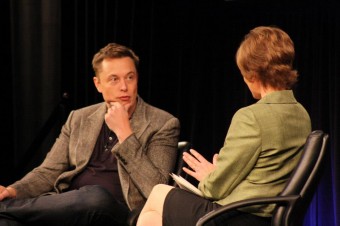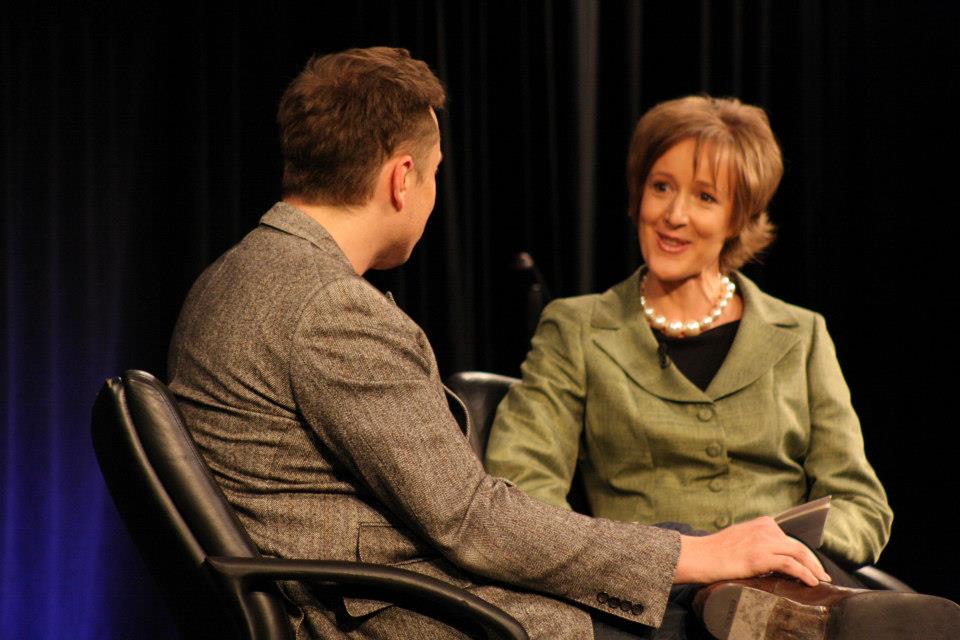Here is the transcript from the final part of my January 2013 interview with Elon Musk at the Computer History Museum. We discuss team building; time management; the Buffett school of thought; keeping companies ‘in the family;’ and why Musk wants to die on Mars, just not on impact.
More transcript excerpts are available at Fresh Dialogues. See below for selections.
This transcript begins at 1:05:02 in the interview.
Alison van Diggelen: It’s one thing to have these wonderful ideas in the shower or at Burning Man, but it’s another to build, motivate and retain a team of excellent people. Can you talk about some tips and things you’ve learned that obviously work for you?
Elon Musk: Well I mean, think about a company. A company is a group of people that are organized to create a product or service. That’s what a company is. So in order to create such a thing, you have to convince others to join you in your effort and so they have to be convinced that it’s a sensible thing, that basically there’s some reasonable chance of success and if there is success, the reward will be commensurate with the effort involved. And so I think that’s it…getting people to believe in what you’re doing – and in you – is important.
In the beginning there will be few people who believe in you or in what you’re doing but then over time, as you make progress, the evidence will build and more and more people will believe in what you’re doing. So, I think it’s a good idea when creating a company to create…to have a demonstration or if it’s a product to have a good mark up or even if it’s software to have good demoware, or to be able to sketch something so people can really envision what it’s about. Try to get to that point as soon as possible. And then iterate to make it as real as possible, as fast as possible. If that makes sense.
.
Alison van Diggelen: So you’re CEO of two companies, you’re chairman of SolarCity. Talk about time management. How on earth do you do this? Do you get any sleep?
Elon Musk: Sometimes, not enough. Sleep is really great. I find if I don’t get enough sleep then I’m quite grumpy. Obviously, I think most people are that way. And also, I try to figure out what’s the right amount of sleep, because I find I can drop below a certain threshold of sleep and although I’d be awake more hours and I could sustain it, I would get less done…my mental acuity would be affected. So I found generally, the right number for me is around six to six and a half hours on average per night.
Alison van Diggelen: And any other tips on managing to run two companies simultaneously?
Elon Musk: Having a smart phone is incredibly helpful because that means you can do email during interstitial periods, like if you’re in a car (he has a driver), you’re walking, in the bathroom, everywhere. You can do email practically when you’re awake and so that’s really helpful: to have email for SpaceX, and Tesla integrated on my phone. And then you have to apply a lot of hours to actual working.
Alison van Diggelen: And where do the boys fit in? You have five sons. Do they tag along?
Elon Musk: I do drag them along on a lot of things actually…they’re remarkably unimpressed. I wish they were more interested…the twins are eight the triplets are six. maybe they’ll get more interested later.
Alison van Diggelen: Do you see one day grooming one of them, or several of them, to take over your companies?
Elon Musk: If they’re really interested in working at Tesla or SpaceX then I’d help them do that. I’m not sure I’d necessarily try to insert them into the CEO role at some point. If the rest of the team and the board felt that they were the right person, then that would be fine but I wouldn’t want people to feel that I’d installed my kid there. I don’t think that would be good for either the company or the kid really.
I was of the school of thought that it’s best to give away 99% or more of one’s assets, the Buffett School of thought. I’m mostly inclined in that direction, but after seeing what happened with Ford, GM and Chrysler, where GM and Chrysler went bankrupt but Ford did not, and Ford seemed to make better long term choices…in part because of the influence of the Ford family. I thought, well OK, there may be some merit in having some longer term family ownership. At least a portion of it. It acts as a positive influence…in the longterm interest of the company…so the company does proper longterm things. Look at what happened also in Silicon Valley with Hewlett Packard. I think it’s quite sad. That to some degree is because there was much diminished influence by the Hewlett and Packard families. I think they should have prevailed…when they were opposed to the merger that took place at one point. I think they were right, actually.
Alison van Diggelen: And looking to the future for SpaceX…is there an IPO planned for this year?
Elon Musk: No, there’s no IPO planned. I must say, running a public company does have its drawbacks.
Alison van Diggelen: So you’re not in a hurry?
Elon Musk. No. In the case of Tesla and Solarcity…we had to raise capital and we had a kind of complex equity structure that had to be resolved by going public. So I thought we kind of needed to do that in those two cases. We don’t have to do that at SpaceX. I think there’s a good chance we will at some point in the future, but SpaceX’s objectives are super longterm and the market is not. So I’m a bit worried that if we did go public, certainly if we went public too soon, that the market pressure would force us to do short term things and abandon longterm projects…
Alison van Diggelen: Like going to Mars?
Elon Musk: Right! Going to Mars is very longterm.

Alison van Diggelen: You do have other projects on the back burner. You’ve talked about the Hyperloop: a way of people getting from downtown LA to downtown San Francisco in under half an hour. An electric supersonic airplane. Which of those two are bubbling up that we might hear more about in the near future?
Elon Musk: I did promise that I’d do some paper on the Hyperloop idea and things got a little hectic toward the end of last year because I’d committed to make these milestones at Tesla, to the public markets, and I had to stay true to that obligation, which required an insane level of work and attention. And then we also had the SolarCity IPO and it was a very difficult IPO to get done. That IPO occurred just by the skin of its teeth. It was such a tough one…
Alison van Diggelen: Were you just determined that it had to be in December?
Elon Musk: Well,if it wasn’t in December, it would mean pushing it out quite a bit and the problem is, we’d already pushed it out quite a bit. So if we didn’t go public, we’d have to do a private round and then…the whole thing wouldn’t feel right. It’s like you’re sitting at the altar, and you don’t do the wedding. It’s a bit awkward. So we really needed to do it and I think if we hadn’t done it, people would have looked at it as a failure. It wouldn’t have been good. There have just been too many failures…in the solar…not enough success, let’s say, in the solar arena. We need to chalk up success…
Alison van Diggelen: It was a rare piece of sunshine for the solar industry last year…
Elon Musk: Right. Exactly. Ironically…the solar industry doesn’t have a lot of that.
You famously said you want to die on Mars, just not on impact (laughter).
Elon Musk: Right. Exactly. 
Alison van Diggelen: Tell us about that dream…
Elon Musk: Actually, I was asked by a journalist, ‘Do you want to die on Mars?’ and I said, ‘yes, but wait…not on impact. Just to be clear.’
That’s one of the possibilities… So I guess I’d like to be able to go to Mars while I’m still able to manage the journey reasonably well. I don’t want to be like 75 and go to Mars…
Alison van Diggelen: You don’t want to take your zimmer frame with you?
Elon Musk: Ha. Right, you know, at least in the beginning, it could be mildly arduous…I’d like to get there ideally in my 50’s. That would be kind of cool.
Alison van Diggelen: So you see that happening, in the next…?
Elon Musk: I aspire to make that happen, and I can see the potential for that happening. I’m not saying it will happen, but I think it can happen…I’ll try to make it happen.
Alison van Diggelen: Great. Ladies and gentlemen: Elon Musk.
(Applause)
Highland Cathedral music courtesy of Carol Stiglic, VP Programming, Computer History Museum
Want to continue reading the transcript?
Here are earlier transcripts:
Elon Musk: On South African Childhood, Iron Man and The Meaning of Life
Elon Musk: The Reluctant CEO of Tesla Motors
Elon Musk: On Obama, Climate Change and Government Regulations
Elon Musk: On Critics, Steve Jobs & Innovation
Check back soon for more transcript excerpts at Fresh Dialogues




